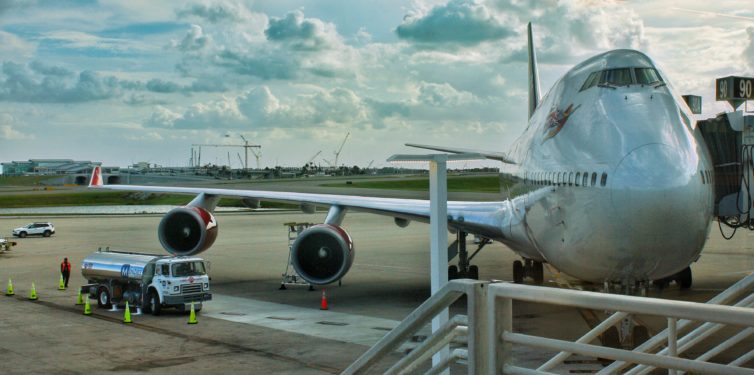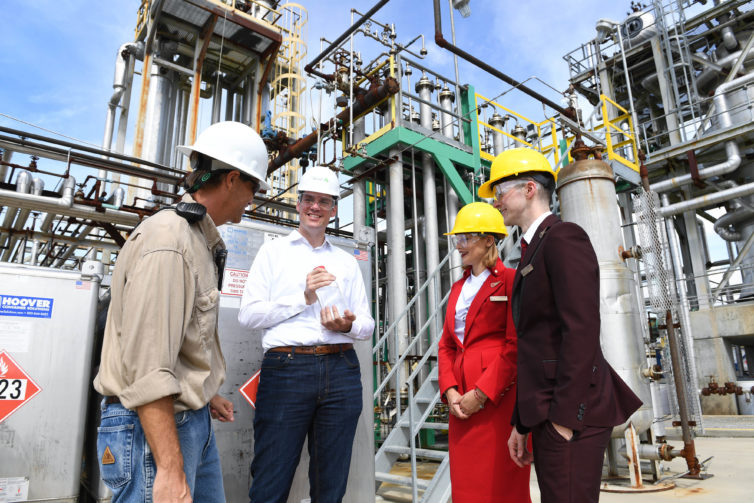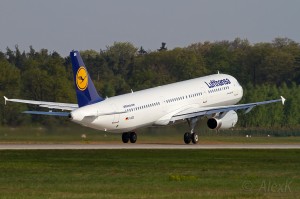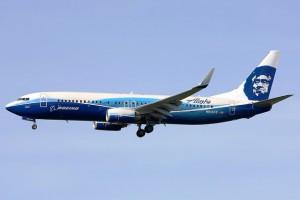
The aviation sector is responsible for roughly two percent of global carbon dioxide emissions. If current trends continue, its share of the total is expected to grow substantially in coming decades. Fortunately, in recent years a number of airlines have made concerted efforts to make flying more environmentally sustainable. Most of the solutions to date have involved biofuels made from plant-based compounds. But Virgin Atlantic took a different approach, partnering with the U.S.-based company LanzaTech that was developing a technology to turn industrial pollution into jet fuel.
On October 2nd, the partnership achieved a major milestone: the first passenger flight powered (in part) by the innovative new fuel. There was plenty of fanfare around the flight, which we were on hand to cover. And though the flight was one incremental step out of many required to make the tech mainstream, it was still a milestone worth celebrating. Read on for our full coverage of the announcement, press conference, and the flight itself — including a surprise appearance by Sir Richard Branson!

Photo: Doug Peters/PA Wire

Lufthansa is using this Airbus A321 (D-AIDG) to operate their first scheduled flight using biofuels.
Airlines and airline manufactures have been experimenting with biofuels for quite sometime. It has been successfully shown that airliners are able to fly on biofuel and companies around the globe are working to make sure it is economically feasible and sustainable.
Last week, Lufthansa Airlines started flying an Airbus A321 (D-AIDG) on scheduled service from Hamburg to Frankfurt using a 50/50 mix of regular and biofuel on one of its engines and standard jet fuel in the other.
“The main focus of this test is to examine the effects of biofuel on the lifecycle of the engines and other operational issues,” Martin Riecken, Director Corporate Communications, The Americas explained to AirlineReporter.com. “Two of the main roadblocks are availability of biofuel on a larger scale and the price point. Right now, biofuel is about 60-70 percent more expensive than regular jetfuel.”
The aircraft will operate on the biofuel for a test period of six months. The biofuel is similar enough to jet fuel, that the aircraft needs no additional modifications.
Christoph Franz, Chairman and CEO of the Lufthansa Group, said via a press release: ’œLufthansa is the first airline worldwide to use biofuel in scheduled daily flight operations. We are thus continuing to steadily implement our proven and successful strategy for sustainability.’
The fuel used on the Lufthansa A321 is developed from pure biomass and consists of jatropha, camelina and animal fats. The airline requires that the original product originates from a sustainable supply and is not in direct competition with food production.
When asked if Lufthansa plans to continue to fly with the biofuel Riecken replied, “There are no current plans to continue biofuel operations after the completion of the six-month test phase, but we will continue to support further research efforts.”
By implementing new technologies, Lufthansa has improved their fuel efficiency by over 30 percent since 1991 and on average, their fleet has a fuel consumption of 56 MPG per passenger.
Image: AlexK3800

Alaska Airlines 737-800 with special Boeing livery (N512AS)
Alaska Airlines, Boeing, Portland International Airport, Seattle-Tacoma International Airport, Spokane International Airport and Washington State University are working together to promote aviation biofuel development in the Pacific Northwest. The regional assessment is called the Sustainable Aviation Fuels Northwest (SAFN).
The group hopes to examine all phases of developing an aviation biofuel industry and the funding is being split between the involved parties. SAFN will be looking at local biomass sources that can be found in the Pacific Northwest.
“By transitioning to a more fuel-efficient fleet and adopting technology to follow more direct flight paths, Alaska Airlines has made significant strides in minimizing the environmental impact of our flying in the communities we serve,” said Alaska Air Group Chairman and CEO Bill Ayer. “Through this initiative, we are joining other key stakeholders in our region to explore the development of alternatives to jet fuel that could further reduce our carbon footprint.”
The project is starting this month and is expected to take about six months. Air travel currently generates approximately 2 percent of man-made carbon emissions, and the industry has set aggressive goals to lower its carbon footprint, which includes the use of aviation biofuel when it becomes available.
This is only one of several regional biofuel projects that Boeing is currently working with. Curious to find out what Boeing hopes to achieve in this project, I spoke with Terrance Scott, who is with Boeing Environmental Communications. He explained there are four ways to help airlines curb their carbon emissions. The first is product development, where Boeing creates new, more fuel efficient aircraft, like the Boeing 787 and the Boeing 747-8. The second is to retrofit currently flying aircraft with performance packages, winglets and other items. Third is to change the way airlines fly and operate aircraft in order to be more efficient. The last way is the type of fuel used to power the aircraft.
Boeing has helped or will be helping to set up similar regional groups in the Middle East, China, Australia and Mexico. The hope is to create a regional portfolio of fuel sources to create aviation biofuel. Scott told me that Boeing wants to motivate people to find answers, but is not looking to get into the biofuels business themselves. “Boeing doesn’t want to get into the fuel business, but we want to serve as a catalyst.” Their plan is to bring people together, to start talking and working on creating sources for biofuel.
The use of biofuels have already been successfully tested. Boeing has worked with Air New Zealand and Continental to show airlines can successfully use biofuels. Now that biofuel has been proven to be a good alternative to legacy jet fuel, the shift is being made to find a sustainable, economically feasible fuel source. They want to make sure that a fuel source won’t compete with any food source (ie corn and E85).
Most likely any biofuel will cost more than jetfuel today. Would passengers be willing to pay a little bit more to fly green? I think there are some that would, but I am not sure if there would be enough.
http://safug.org/
Image: Axel J



